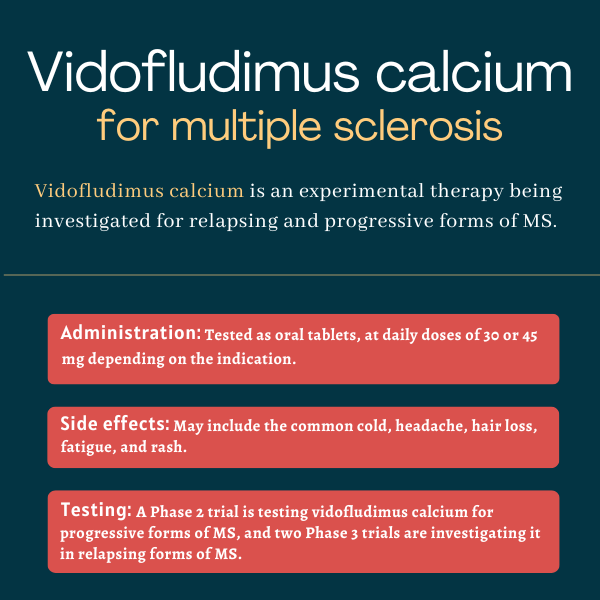
FAQs about vidofludimus calcium in MS
Vidofludimus calcium is an experimental therapy that’s still in clinical trials for multiple sclerosis (MS). The medication is expected to lessen inflammation and prevent MS damage by inhibiting the growth of certain activated immune cells. In clinical trials, vidofludimus calcium treatment resulted in a significant reduction in the number of lesions in people with relapsing-remitting multiple sclerosis. The therapy also showed some promising benefits in relapse rates and disability worsening among these patients.
Phase 3 clinical trials testing vidofludimus calcium for relapsing types of multiple sclerosis are underway, as are Phase 2 trials assessing the oral medication as a treatment for progressive forms of the disease. According to Immunic Therapeutics, the therapy’s developer, these Phase 3 trials may support regulatory applications seeking approval for the medication from the U.S. Food and Drug Administration (FDA). It is too soon, however, to determine if or when the medication could be approved by the FDA.
Clinical trials of vidofludimus calcium have not recruited and are not enrolling multiple sclerosis patients who are pregnant or breastfeeding. Whether the therapy can be safely used in these situations is not known.
Some patients in clinical trials have seen benefits after six months of treatment with vidofludimus calcium. In the EMPhASIS Phase 2 study, which investigated the oral therapy against a placebo in people with relapsing-remitting multiple sclerosis, treatment significantly lowered the number of active brain lesions after about six months. However, given that multiple sclerosis can manifest differently in every patient, individual responses to treatment may also vary.
While weight gain was not reported as a side effect of vidofludimus calcium in multiple sclerosis clinical trials, hair loss was experienced by some patients. It is recommended that patients talk with their healthcare providers if any unexpected side effects arise when using a new therapy.
 Fact-checked by
Fact-checked by 


